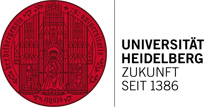Research Alumni Network Conference Japan
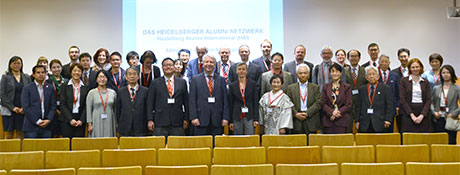
The fourth Research Alumni Network Conference of Heidelberg University took place in Kyoto in April 2018 under the motto ‘Research as a Bridge to Internationalization’. After meetings in New Delhi (India) and Boston (USA) in 2012, and in Rome (Italy) in 2013, this marks the latest expansion of the Research Alumni Network, which now encompasses not only South Asia, North America and Europe, but also East Asia. The objective of the conference on 14–15 April was not only to inform the participants about the Research Alumni Network of Heidelberg University and its funding and support options, but most of all to develop new strategies and ideas for internationalisation and to build on existing bi-national best practice projects in the East Asia region.
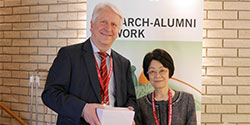
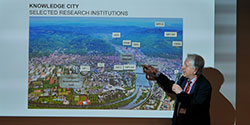
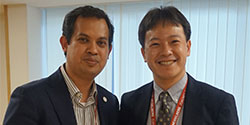
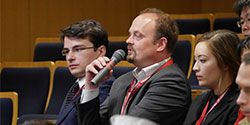
After an opening address by University President Professor Bernhard Eitel and a greeting by Professor Kayo Inaba of Kyoto University, the 30 attending researchers from Japan, China, Taiwan and South Korea received an introduction to the Heidelberg Research Alumni Network and its services for (former) visiting scientists, followed by a varied and informative programme. It included an overview of research and funding options in Germany, with special focus on the programmes of the Alexander von Humboldt Foundation (AvH) and the German Research Foundation (DFG). Next, the audience learned about the positive effects of a successful research stay in Heidelberg by the example of two academic careers: Under the heading ‘2 Alumni—2 Experiences: “Research in Germany”’, Professor emeritus Kazuhiro Hara, MD, of Kagawa University and historian Dr Takashi Fujii of Kwansei Gakuin University talked about opportunities, challenges and experiences gained during their respective stays as visiting academics in Heidelberg—one as a researcher more than 35 years ago, the other as a doctoral student just a few years back.
The highlight of the event was a panel discussion on the overarching theme of ‘Research as a Bridge to Internationalization’, followed by a discussion with the audience. The panel consisted of President Bernhard Eitel, who represented Heidelberg University, German scientists Professor Peter Comba, Director of the Department of Inorganic Chemistry, and Professor Katja Mombaur, Head of the research group ‘Optimization, Robotics and Biomechanics’, and Japanese scientists and research alumni Professor Yuko Nishitani, a jurist at Kyoto University, and chemist Professor Masahiro Yamashita of Tohoku University. Moderated by the head of the DAAD office in Japan, Dorothea Mahnke, the scientists debated with two representatives of research funding organisations: Dr Jörg Schneider, Head of International Affairs at the DFG and Director of the Japanese DFG office, and Mariko Kobayashi of the Japan Society for the Promotion of Science (JSPS). The central topic was the internationalisation of universities and the role played by research in this process.
‘What is the significance of internationalisation for the work of researchers? How have science and research changed in recent years—are there new constraints and can we avoid them? What is the effect of changing framework conditions on personal and project funding? What are common goals? How can and do research organisations influence internationalisation?’ These and other questions posed by the moderator helped the panel members explore the role of research for internationalisation and vice versa. The conclusion was clear—internationalisation is a permanent process that we cannot do without: ‘What we need is a continuous exchange between cultures’, explained Peter Comba. ‘A different cultural development sometimes gives rise to entirely new questions that in turn have led and continue to lead to very different problem-solving approaches, tools and results. That is what makes international exchange so valuable.’ And with a university management that consists of experienced researchers—and not of industry bosses—President Eitel feels more than up to the challenge: ‘It’s much easier to bring researchers on board if the University President’s Office can draw on the expertise of its own members.’
Next on the agenda was a presentation of two different models of international cooperation: Biophysicist Professor Motomu Tanaka, who works at the universities of Heidelberg and Kyoto, introduced the German-Japanese university consortium HeKKSaGOn—a joint project of the universities of Heidelberg and Göttingen, the Karlsruhe Institute of Technology and the universities of Kyoto, Osaka and Tohoku that has been supporting a number of research groups since 2010. Another example is the joint international master’s programme in transcultural studies of the universities of Heidelberg and Kyoto that was initiated by Professor Harald Fuess and Björn-Ole Kamm—the first and, to date, only double-degree programme in the social sciences and humanities that is offered in Japan with an international partner.
The ‘Open Space’ part of the programme gave the attending research alumni the chance for one-on-one talks, spread over several theme tables where they could share information and experiences with scientists and representatives of the participating universities and institutions. On the professional level, Peter Comba and various chemists among the attending research alumni who had been in contact for some time had already engaged in a lively exchange at a ‘Scientific Meeting’ the previous day. Under the motto ‘The Chemistry is right!’, the participants of this mini-symposium talked about the latest developments in their research and shared their findings, as well as information on current and future cooperation projects. ‘Such specialised symposia usually take place in the context of scientific conferences—but this was a special opportunity to talk shop during an alumni meeting’, explained Peter Comba.
Another highlight on the first day of the meeting was a public lecture with subsequent discussion that was given by Heidelberg gerontologist Andreas Kruse on the subject of ‘Creative Ageing in Different Countries and Cultures—What we can learn from Biology, Medicine and Cultural Anthropology’. This lecture kicked off the Heidelberg Lecture series, which has already become a fixture in other countries and will now see Heidelberg researchers present their work in Japan as well.
‘We had two inspiring days full of fascinating encounters and talks’, summarises HAI director Silke Rodenberg. In the interest of sustainability, five HAIreconnect grants were made available directly during the event. ‘We want to immediately build on and intensify these new contacts and look forward to welcoming our East Asian colleagues in Heidelberg before long for further scientific exchange.’ Applications for the grants will be accepted until 15 September 2018.
